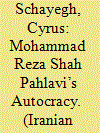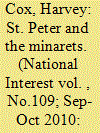| Srl | Item |
| 1 |
ID:
088337


|
|
|
| 2 |
ID:
162784


|
|
|
|
|
| Summary/Abstract |
Even when Mohammad Reza Shah became an autocrat by the early 1960s, systemic constraints on his power persisted. One was government officials. They certainly accepted the shah’s governmental centrality. But in parallel they inventively created more elbowroom for themselves than they are normally credited for, shaping everyday administration and co-shaping policies. The article substantiates this argument in two steps. First, it looks at Iran’s Sāzmān-e bimeh-hā-ye ejtemāʿi-ye kārgarān (Workers Social Insurance Organization [SBIK]), drawing principally on French-language International Labor Organization (ILO) archival files. Although the shah had a well-publicized stake in social insurance expansion, the SBIK influenced policy strategy, sometimes against his explicit wishes; also, it handled routine operations and relations with the ILO independently from him. Second, the article zooms out to analyze Persian-language Harvard University Iranian Oral History Project interviews with high-ranking officials, alongside other published and unpublished sources, to show how government officials maintained some autonomy vis-à-vis the shah. Their strategies included self-effacement, the agreement on a unified cabinet policy position before a royal audience, resignation threats, open pushback, and gifts, including favors, to third parties.
|
|
|
|
|
|
|
|
|
|
|
|
|
|
|
|
| 3 |
ID:
097834


|
|
|
|
|
| Publication |
2010.
|
| Summary/Abstract |
URBI ET Orbi ("for the city and for the world") is the traditional blessing the pope offers on special occasions. Although he has at times pronounced it in other venues-St. John Lateran, the pope's official ecclesiastical seat, or the Quirinale, now the Italian president's residence-the pontiff usually intones the prayer from the balcony overlooking St. Peter's Square. The ancient ceremony reminds us that the pope holds office as head of the Church because he has been elected bishop of "the city," Rome; that he is the leader of a global organization whose very name, "Catholic," means universal (making the whole world his parish); and that he is the head of a miniscule but internationally recognized sovereign state.
|
|
|
|
|
|
|
|
|
|
|
|
|
|
|
|